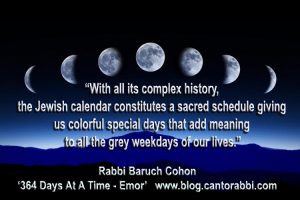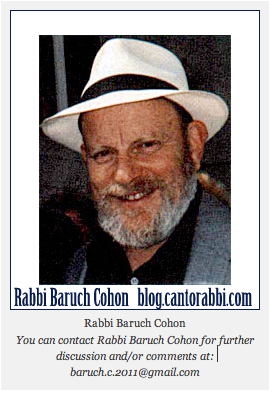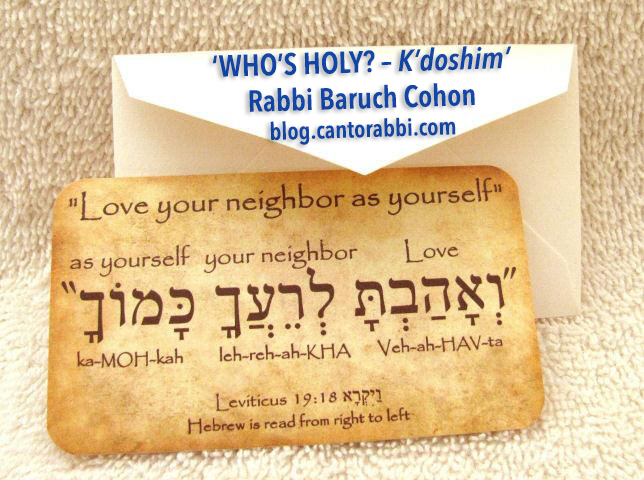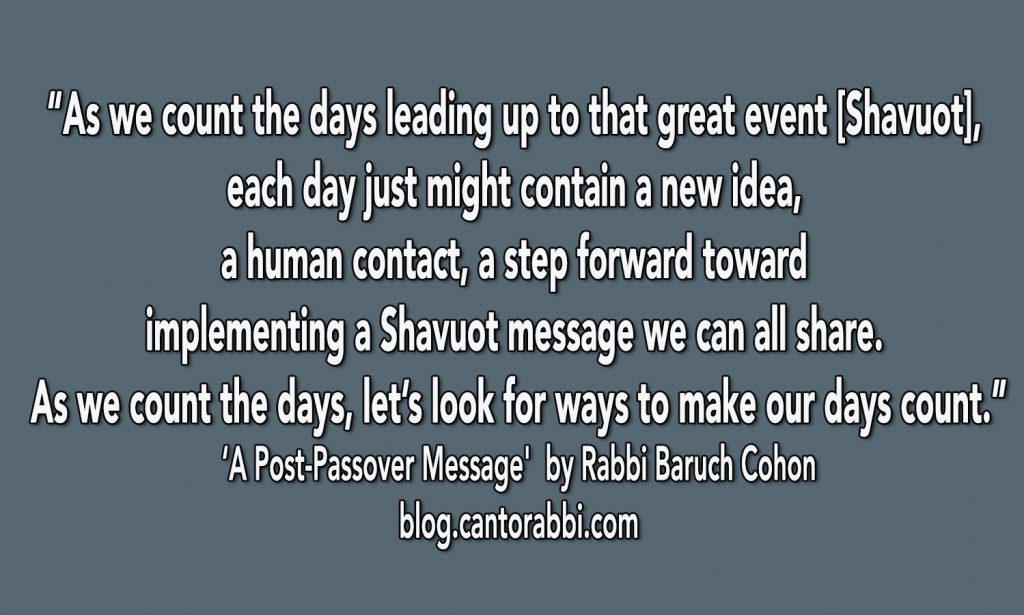354 DAYS AT A TIME – Emor –Lev.21-24, by Rabbi Baruch Cohon
You probably heard about the fellow who decided to become an atheist. He left his family’s house of worship and turned his back on religion. But then a few weeks later, he came back.
“You changed your mind? How come?”
“Atheists have no holidays.”
This Torah reading outlines the Jewish calendar, which provides our annual cycle of holidays both serious and upbeat, and all sanctified by faith. Indeed, Judaism as a way of life is closely connected with the calendar. That connection goes back to our origins. Moses reminded us that we left Egypt in the spring month. Count 49 days – 7 weeks from the Exodus, and on the 50thday we reach Mt. Sinai to receive the Torah and become a nation. And here in Leviticus 23 we go on to detail the dates of Rosh Hashana, Yom Kippur and Succoth – New Year, Day of Atonement, and the Harvest festival, all in the fall.
So why is New Years Day celebrated on the first day of the seventh month? Precisely because Nisan, the month that includes Passover, is the month of freedom, and is specifically designated as the first month of the year in the very story of the Exodus. The Talmud’s tractate Rosh Hashana lists four “New Year’s days” every year: one for kings, one for numbering years, one for planting trees and one for tithes. In our urban culture, of course, we limit our ceremonial New Year to the 1stof Tishri. That is the day we change the number of the year.
As we all know, the Jewish calendar, like the Chinese, is based on the moon. 354 days on average, instead of the 365 of the solar calendar. That causes considerable variety in how Jewish holidays compare with those of our neighbors. In 2011 and 2019, for example, Hanukkah coincided with Christmas. In 2013 it coincided with Thanksgiving.
7 times in every 19 years, the Jewish calendar adds a month during the spring, forming a leap year that resolves the lunar-solar difference. An ancient scholar named Shmuel who headed the academy in a Babylonian town called Nehardea was responsible for much of the development of the calendar used today. The Talmud describes him as a man who knew the orbits of the planets as well as he knew the streets of Nehardea. This self-taught astronomer laid the groundwork for a system that gives Jews the world over the opportunity to celebrate their holidays at the same time. In the days of much slower communication, they had to add a day to the holiday if they lived outside of Israel, in order to make sure they were all observing the occasion together. Hence we still have the Second Day of many festivals in traditional Diaspora communities but not in Israel. A notable exception to this rule is Rosh Hashana itself, the New Year, which is observed for two days in Israel too. That second day is not considered an “second holiday of exile” (yomtov sheyni shel goluyos) but the two days are called “one long day” (yoma arikhta). One more opportunity to hear the call of the Shofar!
With all its complex history, the Jewish calendar constitutes a sacred schedule giving us colorful special days that add meaning to all the grey weekdays of our lives.
Personally, of course, I feel a special connection to “Emor” because I chanted this section at my own Bar Mitzvah. That was a long time ago, but the message of this reading rings just as strongly in my ears today. Opening with detailed rules and regulations for the priests – the Cohanim, Aaron’s sons and descendants – from their personal conduct to their sacrificial duties, “Emor” continues with the entire calendar sequence. Between these two sections, we find two short sentences that give all the laws their basis. They come at the end of Chapter 22. There, verse 31 says: “Keep my commandments and do them; I am G-d.” And verse 32 adds: “Do not profane My holy name, and I will be sanctified among the Israelites; I am G-d who sanctifies you.” Here are divinely inspired rules that, if we follow, enable us to achieve Kiddush haShem – sanctifying the Divine name. Violating those rules amounts to Khillul haShem –profaning that name.
Violations can take many forms, some more obvious than others. For example, our Torah instructs us to use true measurements – weights, lengths, coins, all must be accurate. Prevent cheating. In legal disputes, we are cautioned to do justice “justly.” Tricking a witness in a trial, or manufacturing evidence against a litigant – even if you deeply believe him guilty –is unfair and therefore prohibited. In family affairs, acceptable conduct has countless Mitzvos to be observed, including the rights and duties of wife and husband to each other, of parents and children to each other, and of all to the care of ill and dead family members.
Crime and punishment get dealt with in this section too. “One who strikes [wounds or kills] an animal shall pay for the damage. One who kills a human shall die.” But it takes two eye witnesses to convict the killer. All these and many more Mitzvos can be fulfilled – or violated.
Violating a principle of conduct in business, particularly when dealing with Gentiles, can bring serious trouble to the entire community. Our enemies come up with many false charges to support their actions against us. We must not provide them with legitimate cause. In this connection the Hertz commentary quotes the story of the fellow in the boat drilling a hole under his seat. It’s only under his seat, but all will drown. A Jewish crook can give an open door to anti-Semites. That is definitely khillul haShem. And what about the opposite? Suppose we are doing right? Inquisitors demanded “convert or die.” Nazis and jihadis offer no alternative: “Kill the Jews!” Their victims are mourned with the righteous.
All important is not death but life. Living in such a way as to sanctify the name of the G-d we worship involves fulfilling Mitzvos, from observing the occasions of our calendar – Sabbath, festivals, matzoh on Passover and fasting on Yom Kippur – to how we interact with other human beings, Jewish or Gentile. How we live our daily lives makes us aware of those Mitzvos, and carrying them out builds our character. Do we deal honestly in business? Do we respect our elders? Do we teach our children Torah? Do we help the poor? Do we support just causes? That’s the kind of life that sanctifies G-d’s name. That kind of behavior sanctifies our lives. That is Kiddush haShem (sanctifying the Holy Name), Kiddish hakhayyim too (sanctifying life). Torah offers us some practical help to sanctify our lives.
Today and every day, this week and every week, let the words of “Emor” remind us of our ongoing choice: profane or sanctify.








PROCLAIM LIBERTY – B’har – Lev.25:1—26:2, by Rabbi Baruch Cohon
PROCLAIM LIBERTY – B’har – Lev.25:1—26:2, by Rabbi Baruch Cohon
By far the most famous words in this week’s Torah reading are the ones from Chapter 25 verse 10, which are engraved on the Liberty Bell: “Proclaim liberty throughout the land to all its inhabitants.” Certainly an inspiring message for a newly independent nation! Actually, in their original context, they do not mandate anything political at all.
As we read this section, we see a society that is first of all agricultural and secondly hereditary. Once Joshua conquered the country, each family’s property was established, and was intended to remain that way permanently. No family farm could be legally pulled away from its ancestral owners. If one owner fell into debt for any reason, he could sell his crop to a wealthier tribesman, who would then operate his farm – but only until the next Jubilee year. And the Jubilee comes every 50 years, so if the farm is “sold” in year 30, the sale is only good for 20 years. So it is mandated in this reading.
Similarly, if a poor Jew in ancient Israel sold himself into indentured servitude, his master had to release him when the Jubilee year rolled around.
The Hertz commentary points out that these laws helped prevent the land and the people from becoming subservient to a privileged class. Less debt means more equality. The Torah does not state that, but it is worth considering.
In the previous section, we were instructed to count days. 7 days times 7 weeks for the time between Passover and Shavuot, which occurs on the 50thday. Now we get a parallel instruction to count years. Every 7thyear is a Sabbatical, a year off for the land – too bad the land cannot spend that year in Hawaii – but after 7 Sabbatical years comes the Jubilee, which means no planting and no reaping for two full years, the 49thand the 50th. In this connection, the Torah promises a blessing on the 6thyear of that cycle – effectively year #48 – that will see the land producing enough to feed its owners for 3 years. During the Jubilee year, says the Torah, you don’t need to work the land or bring in a harvest. Just “eat from the field.” Any field, whether it is legally yours or not. Questions about this custom abound. Did our ancestors really observe it? After all, the limitation on transfer of property only applied to agricultural property. A house in a walled city could be sold permanently. In Israel today, shmitah produce – what grows during the Sabbatical years – is banned for religious people, and you see labels that declare “not made with Shmitah ingredients.” Jubilee years present an even greater problem.
And now back to the Liberty Bell. We are instructed to announce the Jubilee year on Yom Kippur by sounding the Shofar. Why then? After all, the year started on Rosh Hashanah, 10 days earlier. And what kind of liberty are we proclaiming?
The sage Rabbi Isaac Abarbanel compared the Day of Atonement to the day Israel received the Torah. Just as accepting the Torah could free the people from the Evil Urge and its punishments, so Yom Kippur is the day of freedom from that old foolish vengeful enemy king called Satan, who is the Evil Urge, and all this is to remind each of us to keep the Day of Freedom always before our eyes.
What is our kind of liberty? No longer a year just to eat what we find because we must not grow crops. It is, this year and every year, individually and collectively, the vision of freedom from evil. And Yom Kippur will be the perfect day to proclaim it. Let that T’kiah g’dolah at the end of next Yom Kippur remind us: every year can be our spiritual Jubilee.
A little further along, in the classic translation of Chapter 25 verse 35 we read: “If your brother be waxen poor…” Waxen poor??? Like a bad face job? No, that is the accepted Elizabethan English for the Hebrew word yamukh,which means a personal or economic downfall. More about yamukh later. What we can learn initially from this section is how to treat that brother.
First the Torah tells us that if this poor loser comes to you for help, you are to strengthen him. If he is a native Jew, or a convert or, as Ibn Ezra includes, a resident alien, let him live. Help him live. Don’t let him starve. The Hertz commentary points out that no other society had such rules. Not only in the days of the Torah over 3,000 years ago, but right up to the Roman emperor Constantine who instituted poor-relief in the year 315. Even Constantine’s legislation was repealed by Justinian a couple of centuries later. And notice that the Torah directs this rule to the individual, not the state. This is not a “stimulus package.” It is an Israelite’s duty to save a neighbor.
Secondly, we will read that we are not to take interest or usury from him. Yes, he needs a loan. He needs money to feed himself and his family. He needs money to start over, to get back on his feet. If I want to charge him interest, don’t I have a right to it? No, says the Torah. “Revere G-d, and let your brother live with you.” Don’t try to profit from his loss. Both in Biblical and Rabbinic law, a fine line separates legitimate interest – neshekh —from exorbitant usury —tarbis. Here both are prohibited.
Ever been to a Jewish Free Loan office? Every Jewish community of any size has one. In Los Angeles where I live, the JFL lends for economic and medical emergencies, or to help a small enterprise get started, and its borrowers are not all Jews either. Of the thousands of loans on their books, they show a repayment record “in excess of 99%.” Not a bad record. That is Leviticus in action.
Now back to yamukh. Notice that the text specifies a downfall. This current condition was not necessarily always there; this fellow was not always broke. Maybe he was once as successful as you are. Maybe he just made some mistakes. Maybe he got robbed or cheated. Or maybe he is not very smart. This is not a condition he planned. No “entitlements” here. He is out of luck and out of money. Your job is to help him if you can. Of course we can ask “what if this fellow makes a racket out of his poverty? Do you still have to help him?” A legitimate question to be sure. The Book of Leviticus does not treat that possibility, but Talmudic justice would put it in the category of deceit. We have commandments like “Do not deceive your neighbor or lie.” Using the shelter of bankruptcy to take advantage of other people’s generosity is also a form of deceit. Not worthy of help.
Here we are dealing with something more positive. The valuable message of this reading is our personal responsibility to extend a helping hand in an emergency. The Klee Yokor commentary discusses the definite prohibition on taking interest for your help in this situation. Whatever you give this down-and-outer is not a business loan. By contrast, if a rich man asks you for money, go ahead and charge interest. Says the Klee Yokor: “Whoever owns a business always looks for G-d’s help, because of the doubt: will he profit or not?” So he borrows money. The lender also takes a risk, so he is entitled to charge interest. “But,” says the commentary,“seek out the meaning here. The basic purpose [of this ruling] is to forbid usury.” Your unfortunate brother must not be your victim. “V’khai akhikha — Let your brother live.”